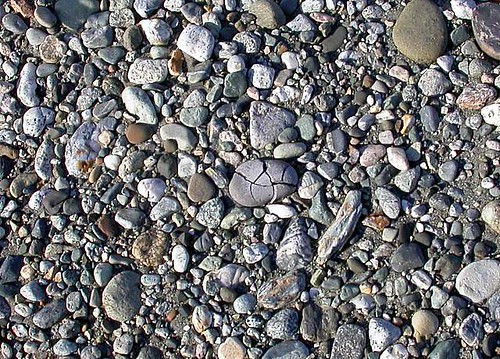Another of my own for National Poetry Month.
Stone Poem
These rocks are words: take them in your mouth
and bite down, crush them, gravel them between
your teeth till they are sand, then spit them out:
gritty consonants, dark vowels on clean
white paper, remnant of a broken tree
once rooted deep in dirt, now blank and pale
as sightless eyes or skin of leprosy
soiled with dust sieved by the teeth, a trail
of scales fallen from the eyes, of notes
drawn up in measured music. Given breath,
they rise up from the page in dancing motes
and whisper in our ears of rumored death:
We rocks, we trees will give rise to new words
when you are gone to dust and scattered shards.
[April 13, 1994]
About this poem
My first sonnet. As described in the introductory essay in my masters’ thesis (Borrowed from Wind, 1997) –
“Stone Poem”… is a Shakespearean or English sonnet, comprising three quatrains, each of which takes its own part in logically developing the poem, and concluded by the couplet’s one-two punch—softened slightly, in this case, by the off-rhyme of words and shards.
Elsewhere in that essay:
Words come from rocks, geese, grass, wind, not vice versa. Hence the reversal that suddenly took place, just before I printed out copies of “Stone Poem” for workshop, from “These words are rocks” to “These rocks are words”…. After workshop, half my copies of “Stone Poem” came back with the single, commanding note [from other students in the workshop]: “These words are rocks!” Which says a lot about just how strong is the received understanding of the “And God said, Let there be light” model of creation-by-the-word.

